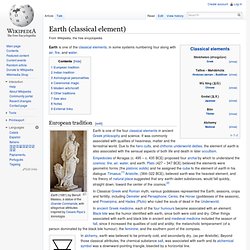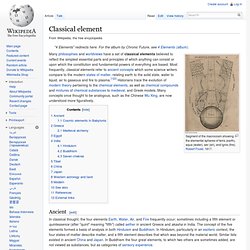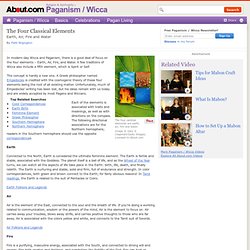

Earth 1. Earth (classical Element) Videos! Playdesen.blogspot.com For more cartoons , desene animate dublate in romana Captain Planet S02E18 - Summit To Save Earth (Part 2) NO COPYRIGHT INFRINGEMENT INTENDED Subscribe/Like/Comment Alex: www.youtube.com Razvan: www.youtube.com Bogdan: www.youtube.com Mihai: www.youtube.com For more cartoons ... playdesen.blogspot.com desene animate dublate in romana Captain Planet - Skumm Lord.avi playdesen.blogspot.com For more cartoons , desene animate dublate in romana Captain Planet S02E08 - The Coral Killer Crackling Color (B7158) For more cartoons ... playdesen.blogspot.com desene animate dublate in romana Captain Planet - Two Futures For more cartoons ... playdesen.blogspot.com desene animate dublate in romana Captain Planet - Polluting By Computer.
Earth 2. Earth (classical element) Earth is one of the four classical elements in ancient Greek philosophy and science.

It was commonly associated with qualities of heaviness, matter and the terrestrial world. Due to the hero cults, and chthonic underworld deities, the element of earth is also associated with the sensual aspects of both life and death in later occultism. In ancient Greek medicine, each of the four humours became associated with an element. Black bile was the humor identified with earth, since both were cold and dry. Other things associated with earth and black bile in ancient and medieval medicine included the season of fall, since it increased the qualities of cold and aridity; the melancholic temperament (of a person dominated by the black bile humour); the feminine; and the southern point of the compass.
Alchemical symbol for earth In alchemy, earth was believed to be primarily cold, and secondarily dry, (as per Aristotle). Prithvi (Sanskrit: pṛthvī, also pṛthivī) is the Hindu earth and mother goddess. Earth 3. Classical element. Segment of the macrocosm showing the elemental spheres of terra (earth), aqua (water), aer (air), and ignis (fire).

Robert Fludd. 1617. Many philosophies and worldviews have a set of classical elements believed to reflect the simplest essential parts and principles of which anything can consist or upon which the constitution and fundamental powers of everything are based. Most frequently, classical elements refer to ancient concepts which some science writers compare to the modern states of matter, relating earth to the solid state, water to liquid, air to gaseous and fire to plasma.[1][2] Historians trace the evolution of modern theory pertaining to the chemical elements, as well as chemical compounds and mixtures of chemical substances to medieval, and Greek models. Many concepts once thought to be analogous, such as the Chinese Wu Xing, are now understood more figuratively. Ancient[edit] Cosmic elements in Babylonia[edit] Greece[edit] Medieval alchemy[edit] Egypt[edit] India[edit] Earth 4. The Four Classical Elements: Earth, Air, Fire and Water. In modern-day Wicca and Paganism, there is a good deal of focus on the four elements – Earth, Air, Fire, and Water.

A few traditions of Wicca also include a fifth element, which is Spirit or Self. The concept is hardly a new one. A Greek philosopher named Empedocles is credited with the cosmogenic theory of these four elements being the root of all existing matter. Unfortunately, much of Empedocles’ writing has been lost, but his ideas remain with us today and are widely accepted by most Pagans and Wiccans. Each of the elements is associated with traits and meanings, as well as with directions on the compass.
Earth Connected to the North, Earth is considered the ultimate feminine element. Earth Folklore and Legends Air Air is the element of the East, connected to the soul and the breath of life. Air Folklore and Legends Fire Fire is a purifying, masculine energy, associated with the South, and connected to strong will and energy. Fire Folklore and Legends Water: Water Folklore and Legends. Earth 5.